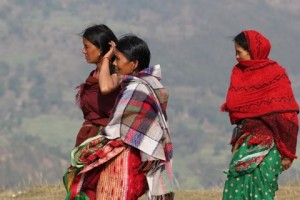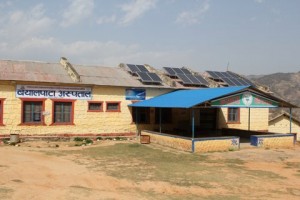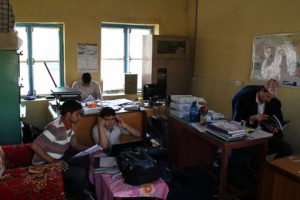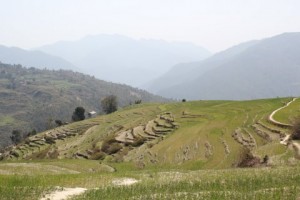Journey to the End of the Earth
I realized quickly, after just having traveled to various villages in rural India, that distance is relative. Hailing from a city like San Francisco, going even a few hours outside of town is far – but twelve hours outside of a major city? I half expected to run into another country.
This remote place in mention is Achham, a tiny hillside region in Far West Nepal. Sitting like a giant amongst the lush green terraced mountains of Achham, is a hospital named Bayalpata. Once an abandoned building, it has been revived by the committed NGO Nyaya Health. I had the opportunity to visit this hospital last month and see the vision of Nyaya Health’s staff—free quality medical services and health equity for the residents of one of the poorest districts in Nepal.
Achham’s population is about 250,000, but unfortunately its socioeconomic statistics are nothing to boast about. Bayalpata Hospital’s main cases are deliveries, in a region where the maternal mortality rate is 800 per 100,000. By comparison, the U.S. mortality rate is 8 per 100,000. Looking further into Nyaya Health’s collected baseline surveys reveals an even more troubling picture:
** The average daily per capita income is $0.50.
** 92-95% of homes don’t have electricity.
** The average level of education is 1-1.5 years of schooling.
** 60% of children are chronically malnourished.
** 50% of households have a member working seasonally in India. Not coincidental to these circumstances, this district is believed to have one of the highest rates of HIV and labor migration.
** 55% don’t have access to safe drinking water, two and a half times the national average.
Despite these heartbreaking statistics, inspiration can be found in the phenomenal work that Nyaya Health is doing in this region. An entirely Nepali medical staff, the hospital is slowly gaining parts to its whole. While we were there, we saw the beginning of a brand new surgery ward; the new toilet received its final touch with a fresh cover of tiles; a mason fitted new window frames for the entire hospital.
The Country Director, Greg, went on with his work approving funding for expanding staff and volunteer quarters –even as 20-30 people went in and out of his office with inquiries. And all this was happening next to the most expansive view of the region –a majestic valley before us, the mountains and the riverbed below appeared to carry a postcard-like quality. It was only the economic reality of this beautiful region that quickly brought us back to attention. About 200 adults and children filtered through the outpatient department that day. The waiting room was packed.
Nyaya Health was created in 2005, when they began setting up the organization, doing research and putting together staff. By 2008, Nyaya was up and running, providing medical services to the community. It was originally started by three medical students from the United States but has been pushed forward by the Nepali staff in Achham with a support team in Boston. One can imagine how rapidly things have progressed here, given the location: from Kathmandu, Achham is a two hour plane ride and ten hour jeep ride up and down a one lane largely unpaved mountain road. From the plane, we saw the Himalayas clear and close; while from the jeep we experienced them firsthand, not knowing when the jeep might slip on a bend. From the terraced hillsides to the tall grass fields a perfect blend of green and yellow, I have never seen a landscape so breathtaking.
Nyaya has their work cut out for them though, as they recently lost 3 key members of their staff who demanded higher pay raises. Without a medical director, it is really hard to run a hospital. But somehow, the staff has persevered, tackling issues like a broken X-ray machine through an 8 hour Skype call with customer service in Spain; or dealing with prior accusations of illegal supply purchases, quelled through transparency of expenses.
Everything related to Nyaya Health is open source. From staff photos to budgetary allocations to board meeting minutes; it is all out there for donors and visitors to see. And in the non-profit world, this is a gift when oftentimes decisions are made based on political, regional, and economic variability.
If I had not seen it with my own eyes, and returned back to tell the tale, I would have thought my visit took me to the end of the earth. But the journey that we made was more than physical – if so many corners of the world could galvanize solutions like this to address inequity, it gives me hope that we can we rally together and carry them through.
This article is printed here with permission. Shwetha Sridharan is passionate about the development sector. She previously worked at Arghyam, an NGO that funds water and sanitation projects across rural India. For more information on Nyaya Health and their work and vision of health care for the poor, visit nyayahealth.org or on twitter @nyayahealth.
SHARE YOUR REFLECTION
6 Past Reflections


On Jan 22, 2018 Call Girl Escort Booking wrote:
Thanks for your reflections of the awaking in the mind , i actually listened to the audio and it turned out to be rather good actually, that is why i also try to release all types of tensions of the mind.
I have been reading this amazing story and now i feel that i should go out of my room a bit more and explore this wonderful world.

On Apr 16, 2012 sia yong kam wrote:
Thanks For sharing with us this amazing story and i feel that being isolated to the rural Nepal and not easy to access is a problem for the help from the outside world . how i wish i can help .

On Apr 15, 2012 Noor a.f wrote:
x-ray machine or dealing accusations of illegal supply purchase!
let us rally and carry together
Nice story

On Apr 15, 2012 Ganesh Singh wrote:
Thanks Nyaya Health !
Thanks US Support !
Thanks Daillygood. Org
Thanks SHWETHA SRIDHARAN for such highly appreciated inspiration!

On Apr 15, 2012 disqus_cFP6xmJjYf wrote:
i am so thanksful that this organisation and other charity and non profit org. do excists! there never will be an end of the world if we continue to give and to serve humanity. it is the beginning of our earth...





On Sep 30, 2024 cglovers wrote:
https://cglovers.com
Post Your Reply